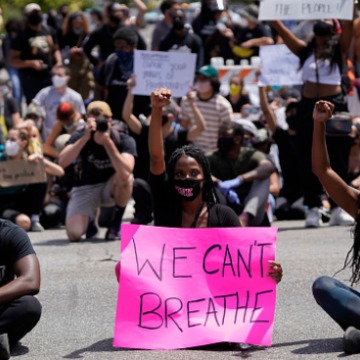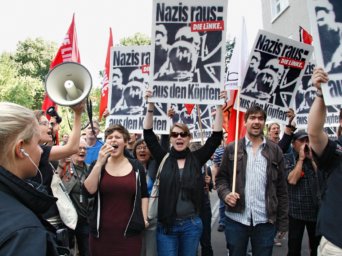- About
- Topics
- Story
- In-Depth
- Picks
- Opinion
- News
- Donate
- Signup for our newsletterOur Editors' Best Picks.Send
Read, Debate: Engage.
| topic: | Racism |
|---|---|
| located: | USA, United Kingdom, Germany, Spain, Japan, New Zealand |
| editor: | Gurmeet Singh |
The Black Lives Matter protests across the U.S. have had global resonance. Not only have all 50 U.S. states held rallies and protests against police brutality, but similar events have also taken place in Germany, the U.K., Spain, New Zealand, Japan and others. All protests have been against systemic racism in general, but specifically against what Dr Kihana Miraya Ross calls “anti-blackness”; that is, the violence and hatred perpetrated against black communities and individuals, as distinct from a more generalised ‘racism’, which covers a broad swathe of social prejudices and antagonisms.
It is encouraging to see so many people across the world push back against systemic racism. However, global protests with specific, localised origins can be problematic. There may be a tendency to transpose 1:1 the situation in America onto a different country – to claim that what is happening in America is exactly what is happening elsewhere. We have seen this before, with London’s anti-austerity campaigners renaming Trafalgar Square “Tahrir Square” in reference to the Egyptian Spring of 2011, something clearly inappropriate.
But encouragingly, the global protests have largely used this moment as an opportunity to speak about specific problems of systemic racism in their own countries. Gary Younge, a journalist and academic, wrote a passionate article for The New Statesman tying the American moment of protest to the U.K.’s problems of systemic racism and classism, as shown up by the Coronavirus death toll:
“A Guardian data analysis in April revealed that a high proportion of BAME residents was found to be the strongest predictor of a high Covid-19 death rate: for every 10 per cent increase in ethnic minority residents there were 2.9 more Covid-19 deaths per 100,000 people…. why should this be? At first glance, the answer appears straightforward. Put bluntly, minority communities are more likely to be poor, and poor people are, in a range of ways, more likely to be vulnerable.”
Younge goes on to explore further problems of entrenched racist social practises, such as ostracising BAME doctors, which prevents these doctors from speaking out.
In Germany, the debate around systemic racism has even been marked by a local legal development. DW writes: “Berlin became the first German state to pass its own anti-discrimination law on Thursday, with a majority of state lawmakers approving the law.
The law explicitly bars public authorities — including police and public schools — from discriminating based on background, skin color, gender, religion, physical or mental disability, worldview, age and sexual identity.
People can also not be discriminated against based on a lack of German language skills, a chronic illness, or on their income, education or occupation.
Under the law, victims are entitled to damages and compensation. Public authorities also have the opportunity to dispute claims of discrimination.
Although the law has been in the works for weeks, it's taken on a new dimension in light of the anti-police brutality and anti-racism protests that have erupted in the United States and spread around the world — including Berlin.”
Not everyone is happy with the development however, with a CDU politician from Baden-Württemberg, Thomas Blenke stating: “Germany is not the USA, there is no problem with racism in the police here.”
Mr. Blenke has apparently not heard about racial profiling, nor with problems associated with radicalisation in police and military networks across the country. However, his comments are pertinent to the discussion. Movements with global resonance can seem inherently suspicious to a nationalist mindset. More seriously, unless they have specific aims and address the concerns peculiar to that country, then they will be ineffective. Marching in solidarity is always welcome, but concrete aims for your own country are even better. Thankfully, we are seeing that with these developments.
Image: LOS ANGELES, CA - MAY 30 Black Lives Matter Holds Protest In Los Angeles After Death Of George Floyd, Warrick Page/Getty Images

